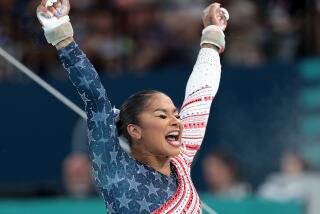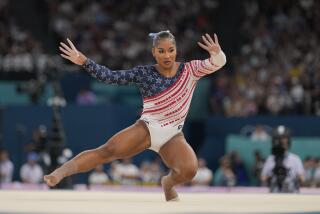U.S. Victory in Volleyball Overturned
- Share via
BARCELONA, Spain — The rousing, come-from-behind, five-set victory by the U.S. men’s volleyball team Sunday in the opening game of the Summer Olympics became a stunning four-set loss 24 hours later, when the International Volleyball Federation upheld Japan’s protest.
The federation announced Monday that 20 of its Control Committee’s 24 members voted without dissent, after a five-hour meeting, to award the victory to Japan. Three Japanese members and an international federation technical director did not vote.
“I’m sorry for the decision,” said Ruben Acosta Hernandez of Mexico, the federation president. “I know it’s going to hurt a lot of nice people in the United States.
“But I swear to you, if you put my hand on the Bible, it was fair.”
Japanese Coach Seiji Oko protested the loss to a three-member federation jury Sunday, arguing that a U.S. player, Bob Samuelson of Playa del Rey, should have been ejected in the fourth set after receiving his second yellow warning card for unsportsmanlike conduct, which would have resulted in a technical point for the Japanese.
Because the Japanese won two of the first three sets and were leading, 14-13, in the fourth, the point would have given them the match. Instead, the referee, Ramis Samedov of Azerbaijan, chose not to issue a red disqualification card to Samuelson after the second warning, ordering play to continue over the objection of the umpire, Laert Francisco de Souza of Brazil.
The United States won that set on a sudden-death point, 17-16, then prevailed in the decisive fifth set, 16-14, to avoid, it seemed, a major upset. The U.S. men are attempting to become the first team to win three consecutive volleyball gold medals.
After hearing reports from Samedov and De Souza, the jury ruled Sunday night in favor of Japan. But only the Control Committee had the authority to overturn the outcome of the match.
“The decision not to give the red card is overruled,” the federation said in a statement. “The red card is called and the point awarded to Japan.”
Acosta said the rules were broken “clearly and indisputably” and added: “It is our duty to observe the rules. It is our intention to have the games decided on the court and to give referees authority, but we have to respect the rules.”
Rich Wanninger, a U.S. Volleyball Assn. spokesman, said Monday that his organization is researching avenues for a possible appeal.
U.S. association officials were confident after the game that the score would stand, believing that the referee had the discretion to determine whether a second warning should automatically result in an ejection and a point for the other team. But they clearly were concerned after being summoned to the 8 a.m. Control Committee meeting at the Via Claris Hotel in downtown Barcelona.
“This reminds me of basketball at Munich in ’72 and boxing in Korea in ‘88,” said U.S. captain Scott Fortune of Laguna Beach, referring to previous Olympic controversies. “For this to happen a day later, that’s unfair. We’re disappointed and angry.”
In addition, The Times has learned that the players on the team voted to either shave their heads or get stubble haircuts in a show of unity and to show their displeasure with the decision. Samuelson has a condition, alopecia universalis, which causes hair to prematurely fall out.
The United States, which had lost only one of its previous 13 games in the Olympics since 1984, has only to finish among the top four in its six-team group to advance to the second round. But its seeding there depends on its first-round ranking. The higher the seeding, the lower-ranked opponent it will play in the quarterfinals.
In the second game of the round-robin tournament against other members of its group, the United States will play Canada today.
“This is a very disappointing situation, but I’m prepared to come back versus Canada and play as hard as I have ever played,” said Samuelson, the team’s seventh man, who was in the game because of a knee injury to starting middle blocker Bryan Ivie of Manhattan Beach. Ivie is doubtful for today’s match.
Samuelson added: “I think the decision will be used to fire up our team for the rest of the Olympics.”
The excitable Samuelson, who drew the second warning for arguing a line judge’s call, said he did not realize that he had received another yellow card. U.S. association officials said there is no second yellow card against him recorded on the official score sheet.
But international federation spokesman Gilles Petit said Samedov told the Control Committee that he issued the second yellow card to Samuelson and admitted that he made a mistake in not ejecting him and awarding a technical point, and thus the match, to Japan.
“Sorry to say, I think his career is over,” Petit said of Samedov, refereeing in his fourth Olympics.
Times sports editor Bill Dwyre, Times staff writer Mike Downey and Mike Littwin of the Baltimore Sun contributed to this story.
More to Read
Go beyond the scoreboard
Get the latest on L.A.'s teams in the daily Sports Report newsletter.
You may occasionally receive promotional content from the Los Angeles Times.







